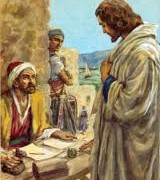Some days are sloppy. Like yesterday.
I tried to concentrate on some Bible reflection and came to the end of the book of Jonah. He was operating under the “great commission” of his era which promised that Abram’s lineage would be blessed so as to be a blessing to every other nation (Genesis 12:1-4).
But Jonah could not imagine God really wanting to bless the Ninevites — those ruthless, godless barbarians, with their arrogant kings and imperialistic intentions. There was no way Jonah was going to go out of his way to show mercy to people who didn’t deserve or desire it. So he boarded a ship bound for Tarshish.
We don’t know exactly where Tarshish was, but we know precisely what it represented: “away from the presence of the Lord” (Jonah 1:3).
Tarshish is any place other than where God calls you to go.
Skip to the end of the Jonah chronicle. Clearly, Jonah’s direction was changed by a great fish, but even after a great revival in Nineveh, the prophet’s heart had not changed.
Even after Nineveh repented, Jonah “re-pouted.” He told God: This is why I fled to Tarshish, “for I know that You are a gracious and merciful God, slow to anger and abundant in loving kindness” (Jonah 4:2).
If you are like me, there are some people more deserving of punishment than mercy. Like Jonah, we have a hard time thinking kindly of them.
Do you recall how God responded to Jonah? “Is it right for you to be angry?”
Sure is, said Jonah, “it is right for me to be angry, even to death” (4:9).
To which God replied, “should I not pity Nineveh?”
In other words, God has the right to show mercy to whomever He chooses, whether we like it or not.
Like Jonah, I lack mercy. I sometimes feel it my right to be angry at what some people do and say. I can’t understand how God puts up with their thinking!
Yesterday, while I was pondering this story, I got a video call from my friend who lives in the Middle East with his family. He works with a Christian ministry in a Muslim country. He and the local director had visited the Minister of Culture and Youth to request permission to distribute Christian literature in a refugee camp. My friend was really excited to meet cabinet officers. The press and photographers were on hand to document the occasion for the newspapers. I rejoiced with my friend over their successful day.
Then I said to him: “This is crazy, and a bit convicting. I can walk down my street and give Christian literature to anyone I meet. I can make friends with someone from the Muslim country you live in, and can actually read the Bible with them. And I don’t need approval from a cabinet minister to do so.”
Then last night Aimee and I took a stroll around our neighborhood as we occasionally do. We took two encouragement cards to neighbors going through hard times. Then we walked over to the apartments nearby where people from several nations live. We stopped and talked to some kids. Said hello to a cluster of women wearing burkas. But none of the adults we’ve met before were outdoors. So we returned home, having left behind a few smiles, waves, and our presence.
This reflection doesn’t really have a clear theme. But I understand Jonah’s urge to flee to Tarshish. I identify with the desire to stay on the couch rather than cross over to the other neighborhood.
And I see that God pays attention even on sloppy days.

